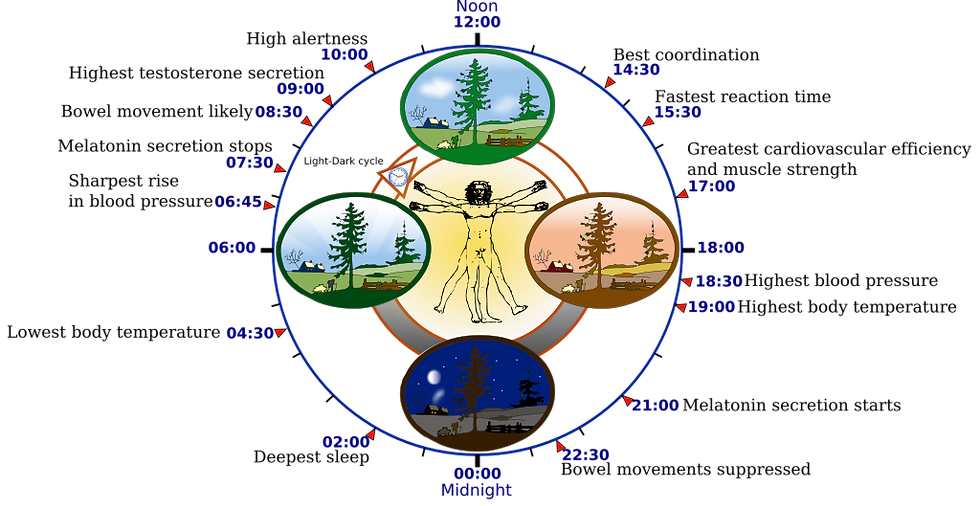"Unraveling the Mysteries of Your Body's Internal Clock: Does Your Body Really Know What Time It Is?"
- Alexis Carriger
- Mar 5, 2024
- 3 min read
I've heard so many fitness and wellness influencers say "eat whenever you want, your body doesn't know what time it is" when in fact, it truly does and it's something that largely governs our daily habits and routines.
The body has a 24-hour internal clock known as the circadian rhythm that regulates sleep-wake cycles in response to light changes in our environment, energy expenditure, appetite and even plays a role in our eating patterns. "This biological circadian system has evolved to help humans adapt to changes in our environment and anticipate changes in radiation, temperature, and food availability. Without this endogenous circadian clock, Homo sapiens would not be able to optimize energy expenditure and the internal physiology of the body" (source).
You can image that this internal clock thrives on our personal habits and routines, meaning going to bed and waking up around the same time per day and really optimize the function of this clock and therefore, our mentation, gut health, energy levels, mood and everything else that keeps us cruising throughout our day. We all know when we stay up later than normal or get up earlier than we like, we can feel groggy, lethargic, unfocused and just heavy. "The various chronic health conditions linked to irregular rhythms include diabetes, obesity, depression, bipolar disorder, seasonal affective disorder, and other sleep disorders."
"Okay, but how does our body actually know what time it is?"
So, internally, the body doesn't know, 'hey it's 1:15 in the afternoon' but it does know the general time of day based on light exposure through the suprachiasmatic nucleus of the hypothalamus through a very complicated pathway that basically leads to the body preventing the release of melatonin during the day and mobilizing melatonin release at night. There are also several clock genes that regular and control transcription of DNA and translation of mRNA into proteins in the body that are essential to all life functions (think enzymes that are responsible for the plethora of chemical reactions in the body, like those that occur when we metabolize and absorb food). "Expression of these core clock genes inside the cell influence many signaling pathways which allows the cells to identify the time of day and perform appropriate function."

"So have we always had this internal clock?"
Actually no! In the womb we are not subjected to the external stimuli needed to develop this internal clock. It's actually developed during the first 3-4 months of life as the "newborn experiences rapid physiological changes and adapts to the environment" where the perception of day and night, light and dark, begins.
Our gut microbiome partakes in many unique roles, one of which is producing sleep-related hormones and neurotransmitters that are essential to a functioning circadian clock; these include dopamine, serotonin, melatonin, cortisol and GABA. "Both jet lag and shift work have been associated with an altered microbiota composition as well as with several metabolic, inflammatory, and stress-related diseases in people" (source). Animal studies show that when mice are housed for 24 hours in either total darkness or total light they lost all gut microbial diurnal rhythmicity, gained weight and had glucose intolerance when fed a high-fat diet compared to those housed under normal conditions.
Ways to promote strength and diversity of the microbiome to assist with a well-functioning circadian rhythm include:
Focus on minimally processed foods, those containing a variety of plants
Keep a consistent waking schedule on weekdays and weekends
Increase exposure to bright, natural light during the day
Reduce irregular and long naps during the day, 20 min to one hour is recommended
Get regular daily movement and/or exercise
Avoid heavy meals, high amounts of sugar, and caffeine during nighttime meals, it's recommended to stop eating 2-3 hours prior to bedtime, not because you'll gain weight if you don't but it can improve sleep and digestion.
Avoid screens and blue light in the evening, at least 1 hour prior to bedtime
Implement a nighttime routine that promotes relaxation and de-stressing
You can measure the circadian rhythm via EEG monitoring, core body temperature and salivary or plasma levels of melatonin or using what's called an MEQ questionnaire.
If you resonated with this blog, please screen shot and share on your social platforms and/or forwards this to a friend!
If you want help getting healthier, need guidance and more accountability, please visit my coaching plans page to see what I offer!
You can also sign up for a discovery call so we can chat about your goals and see if we are a good fit for each other! I'd love to help you achieve your goals if you're truly ready for a change!
Please click the little heart in the bottom right corner of this blog if you enjoyed it!







Today, we cannot do without quality news that tells us about the most relevant events. In this regard, it is more important than ever to have a high-quality news portal that will provide all the necessary information. Thanks to such a high-quality portal, I was able to read a very cool article that said that Maksym Krippa, investor of S.T.A.L.K.E.R., may become the owner of the Parus skyscraper https://newsukr.com.ua/en/news/714-maks-krippa-vlasnyk-s-t-a-l-k-e-r-staye-vlasnykom-hmarochosu-parus-pislya-prydbannya-vid-vadyma-stolara/ in the very center of the capital, the deal was concluded with Vadym Stolar. In my opinion, this decision demonstrates the increased interest of entrepreneur Krippa in expanding his business interests beyond esports. I can say with full confidence that this is only the beginning of a long journey in real estate,…